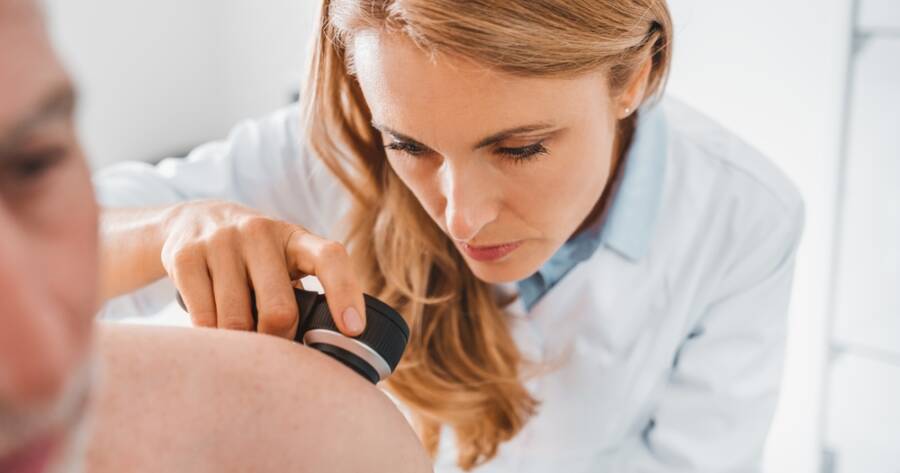Skin cancer, the most prevalent cancer type in the United States, poses significant health challenges but can be effectively managed if identified early. Understanding its types, risk factors, and prevention strategies is essential for protection. Regular self-examinations and awareness of treatment options enhance detection and outcomes, underscoring the importance of vigilance in skin health care.
Understanding Skin Cancer
Skin cancer stands as the most prevalent form of cancer in the United States and can be treated effectively if detected early. This disease arises when there’s an abnormal growth of skin cells, commonly triggered by exposure to ultraviolet (UV) light.
Such exposure often leads to changes, including new bumps or modifications in mole size, shape, or color, suggesting the presence of cancerous cells. Although skin cancer often develops slowly without noticeable symptoms, regular surveillance and self-examinations are crucial for early detection and better health outcomes. The disease primarily affects sun-exposed regions but has the potential to appear anywhere on the body.
Types of Skin Cancer
Skin cancer is categorized into three main types: Basal cell carcinoma, Squamous cell carcinoma, and Melanoma. Basal cell carcinoma forms in the basal cells and is the most common yet least likely to spread, making it easier to treat with early detection. Squamous cell carcinoma, which affects the squamous cells, tends to grow more rapidly and can become invasive. Melanoma, however, is the deadliest form, known for its ability to spread to other parts of the body if not addressed in time.
Detecting Skin Cancer Early
Detecting skin cancer at its early stages is critical for successful treatment and often involves regular self-examinations. This process includes monitoring for new growths or changes in existing moles, spots, or irregular patches. The ABCDE rule is a commonly used guideline for assessing moles, focusing on Asymmetry, Border irregularity, Color variation, Diameter, and Evolution.
Monthly full-body self-checks are recommended, utilizing mirrors for hard-to-reach areas and maintaining a record of moles and growths to monitor any changes over time. Should individuals notice abnormalities, seeking medical evaluation promptly is essential to increase treatment success.
Risk Factors and Prevention
Understanding the risk factors associated with skin cancer aids in proactive prevention. Fair-skinned individuals, those with a history of sunburns, family history, immunosuppression, and advanced age are more susceptible to skin cancer.
Preventative measures include minimizing sun exposure, applying broad-spectrum SPF 30+ sunscreen, wearing protective clothing like hats and long sleeves, and avoiding tanning beds. Incorporating these habits into daily life, along with regular dermatology visits, can significantly decrease the risk of developing skin cancer.
Treatment Options
The course of treatment for skin cancer depends on the cancer type and stage. Typically, surgical options, such as Mohs micrographic surgery, provide highly effective solutions by removing cancerous tissue while preserving as much healthy tissue as possible.
Other treatments include cryotherapy, chemotherapy, and radiation therapy. Early intervention is crucial and can markedly improve the chances of successful treatment outcomes, reinforcing the importance of early detection.
Self-Examination Techniques
Performing regular self-examinations for skin cancer involves a thorough check of the entire skin, ideally done in a well-lit room using both a full-length and a hand mirror for better visibility. Start from the scalp and systematically cover the body, taking special note of often-overlooked areas, to ensure a comprehensive check.
Document any changes meticulously and make use of smartphone cameras or mole maps to track these developments over time. Immediate attention to new or changing skin irregularities, especially if they itch, bleed, or appear raised, can drastically alter treatment outcomes, pointing to the necessity of proactive care.
Learn More About Skin Cancer Detection
Empowering oneself with knowledge about skin cancer detection equips individuals with the tools to actively engage in personal health care. Taking proactive measures not only aids in early detection but also significantly heightens treatment outcomes.
Understanding skin cancer’s risk factors, identifying early changes, and adopting self-examination techniques lay the groundwork for swift intervention. Such actionable insights help maintain skin health and overall well-being, emphasizing the value of remaining vigilant. With resources available for self-checks and educational guides on treatment options, individuals can confidently navigate health care decisions regarding skin health.
Sources
Essentials of Skin Cancer Surveillance
Guide to Monitoring Your Skin for Cancer
Comprehensive Overview of Skin Cancer





